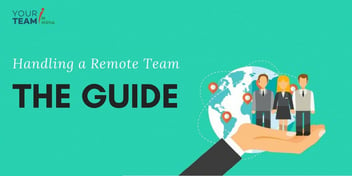“How can I ‘maximize productivity when working with an outsourcing team?” - asked the owner of a renowned firm from one of our outsourcing experts, who was just about to hire an outsourcing team from India for development tasks for his business.
He was curious to know whether he could really analyze how a team, sitting in another corner of the world, is dedicated to making his business a success.
We are sure many of you would relate to him!
And, you all are curious to know how to actually make analyzing the performance of an outsourced dedicated development team li’l more easier.
So, here we are with a thorough learning session for y’all who want to maximize the productivity of your ‘outsourced team.’
(We will cover the complete process to hire the best IT team for your business + Parameters to check whether their performance aligns with your business objectives).
So, let’s begin!
Selection Process of the Outsourced Team
Regardless of your company and business’s size, your outsourcing program will go through these stages.
- Discover Your Business Needs/Requirements

Have you discovered your business needs thoroughly? That is the first step to follow when you want your outsourcing business to flourish. Understand what your business wants, and act accordingly.
Whether you want the existing process to be better, minimize the overall cost of business processes, or wish to hire new developers to complete your team. What is your purpose for outsourcing? Once you figure that out, it is easier to follow the steps further.
Usually, you must focus on these points:
- Purpose of outsourcing
- Processes to be outsourced
- Need for outsourcing concerning business’s core processes
- Critical risks involved in the overall process
- The expected time needed for outsourcing
- Expected benefits of outsourcing
Simply put, you will need to think from different perspectives before outsourcing, and not just one.
- Request for Proposal
The next step is to prepare a ‘request for proposal’ after scrutinizing all points mentioned above. After that, you must examine the proposal before evaluating the list of outsourcing service providers that you have prepared.
Once that is done, list all providers based on their skills and experience in the industry. You will have to match their expertise with your business requirements to find the best match.
In short, you must list all possible outsourcing providers prevailing across the globe. However, the top ones that are most compatible with your business must be prioritized.
Before you do that, it is critical to analyze all aspects of the business (that you need to outsource). The lack of clarity in business proposals may lead to misunderstanding or inability to deliver as expected.
Is there any ‘specific’ way to prepare the Request for Proposal? You May Ask!
Well, there is! Not everyone knows how to prepare a perfect RFP (especially when they are new to outsourcing). So, how do they crack the deal?
Don’t worry; we are jotting down some critical factors, which you must include in your Request for Proposal.
- The Purpose, which includes the extent and nature of the services plus the objective of getting into outsourcing.
- Mention a little about your business - the background information, to be precise. That may include your services, products, statistics, collaborations, automated systems, and all the concerns that you are facing at the moment.
- Mention all specific duties to be done by your IT outsourcing partner. You may even write about what your in-house team will handle (in case you have one).
- What will be the duration of this partnership?
- List down all deliverables such as the reports, schedules, and plans when the partnership begins.
- Talk about what your expectations are from them.
- Don’t forget to mention the payments, mode of payment, bonuses, incentives, and even the penalties.
- Discuss the general and special contractual conditions, including government contracting forms, assurances, or any other certificate (if needed).
- Finally, the procedures for evaluating the success of the project and awards associated with it.
That will make a pretty balanced and smart request for a proposal. Eventually, that will help your outsourcing partner understand it well, without you having to explain every point verbally.
(However, we recommend discussing every point over the call to avoid any misunderstanding in the process).
- Finding Your Right Partner

Once you have prepared the request for proposal document, it is recommended to send it to your top chosen outsourcing partners. You also want to know what they think about the points that you mentioned in the RFP, right?
So, while they plan to come up with their best work, you need to prepare a strategy to find the best one out of all. Because they are going to show their best side at this point. (So, you have to be prepared).
How to Choose Your Best Outsourcing Partner Like a Pro?
Selecting them can be challenging otherwise (but not if you have these questions handy during the interview).
- What did they understand about your business, target audience, and objective?
- How does this collaboration minimize business risks for your business? That means, is your service provider financially viable?
- How good are they in taking the initiative to understand what they didn’t in the first meet?
- What is the vibe when you speak with them - positive or negative or just neutral? Observe that!
- Is there complete clarity of the purpose of outsourcing with having all goals and objectives clear and achievable?
- What are all benefits leveraged by both the parties out of this collaboration?
- How well does their experience and understanding of business satisfy your expectations set for this collaboration?
- What kind of working environment do they follow - a super serious one or chilled, anxious, or a balanced one? Figure that out!
- What will be their strategies to achieve the best for this project within the given timeframe?
- How long are they willing to deliver their services?
- What will be the commitment towards your work if they have multiple clients.
?? Note: The questions can be modified based on your industry. However, with these as the basic ones, you will be able to figure out whether the one you are interviewing suits your business or not.
- Finally, The CONTRACT! (You Really Have Arrived Here)
Lastly, a sound agreement is what will take your relationship to another level of security, trust, and professionalism. That also leads to minimum risk (to both the parties) and a safe zone to work in.
Remember, just because it is a contract doesn’t need to be super complicated. Keep it simple! You need to educate them about your conditions, not confuse them. So, include what’s critical and necessary!
Your contract of outsourcing must include:
- Every critical concern/issue
- The scope (clear and concise)
- Performance Expectations
- Pricing Details
For those more technical specifications, follow this list of ‘What To Include’
- Terms of Agreement - Duration and any specific time to renew the contract (if applicable).
- Services to be delivered
- Terms of confidentiality
- Service Level Agreements (for apt performance measures)
- Force Majeure (Provisions that excuse the outsourced team to perform under certain conditions)
- Warranty - to deliver services as mentioned in the agreement
- Cost change management
- Pricing (in detail)
- Termination plan and terms
Yay, that’s how a smooth outsourcing process functions. ??
?? Note: If you are following these steps (of course, with certain modifications depending on your business), you will be able to get ‘maximum productivity from your outsourced team.
NOW, Imagine you are working with your chosen Outsourced team. How would you want your work to be? What will you expect from them? Do you imagine them working as per your expectations?
Of course, everyone who has outsourced a team would expect the same. But how to analyze whether they are in sink with your business requirements or not (since it is not possible to keep an eye on them 24x7).
Well, there is when AUDIT FRAMEWORK plays its role.

What is Audit Framework, You Might Wonder - Constant process designed to maximize productivity and success of your projects by finding new opportunities, discovering existing problems, and finding apt solutions to fix them.
Mainly, it is conducted to minimize unnecessary tasks and focus on the ones that improve your business processes.
(Not being too technical with the definition - this is what it means to have an audit framework for your outsourced business).
And, if you want to know which audit framework will help you analyze your project successfully - here’s the list!
Audit Framework ‘PARAMETERS’ That Decides the Success of your Project
- Quality - An essential factor to analyze, though! The challenge with the outsourced teams is that ‘you can’t keep a constant eye on them.’ Plus, it can be a more significant challenge if you know a little about the processes they follow.
Recommended Read: How to mitigate outsourcing Risks
What to do?
- Analyze the performance measurement metrics. Check if their performance matches the goals you set for the project. Means, actions, and performance must match the objectives of the tasks outsourced.
- Keep quality and performance standards similar for both in-house and outsourced teams. If that works well for your in-house team, chances are it will work for the other team too.
- If the process involves any documentation, check if that is updated regularly.
- Customer Experience - How satisfactory is it? Are their solutions helping customers solve their problems? If yes, your team is on the right track.
What to Analyze?
- Keep a check on reviews, responses, and sentiments of the user after using your solutions. Trust us; customer feedback is a treasure for you to ensure your business is running as expected.
- Is the feedback received from the customers well? Or, are they talking still talking about the problems. Is their feedback improving after you have outsourced the team?
- How often are you informing customers about the concerns they raised being fixed?
- Added Value to Business - What value have your outsourced team added to your business? Can you describe it without thinking much? If yes, congrats, your team is doing well.

What Next?
- Check if they achieved any of those already set goals for the project or completed the task within set deadlines.
- How much profit ratio has increased since they joined?
- Do they fulfill all your task on priority?
- How many times do you need to remind them about the deadlines?
- Do they take your feedback seriously and work on the points that you mentioned to improve?
Majorly, asking these questions will solve your purpose of conducting the Audit. You can always include or exclude particular audit framework points based on how well your outsourcing team performs.
However, we recommend you run this check after a specific time to keep everything on track.
Yay! You just completed understanding the complete process and audit framework for successful outsourced team management.
If you follow that well, you are going to be another businessman who runs a successful outsourcing team. ?
We bet you can beat your competitors now or even attain better productivity to scale up your business.
Want to make this experience more real?
Why not speak to your ‘personalized outsourcing expert’ (trained to handle all your super-specific outsourcing concerns)?
We have got one ready to help you!
✅ Connect with your outsourcing expert right now!






